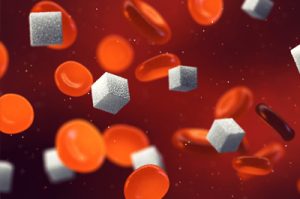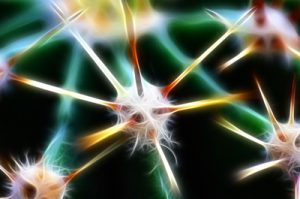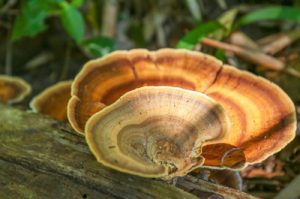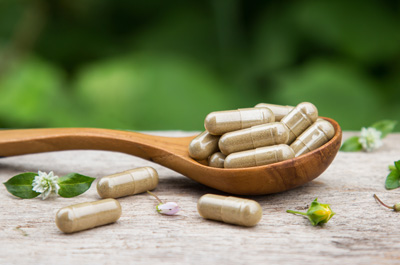
Every person is unique!
Our experienced team will be happy to advise you in detail and free of charge on all matters relating to your health. Book your consultation appointment now:
Coriolus versicolor - The vital mushroom for colds and against viruses
December 6, 2021
Dr. Dorothee Bös et al.
The vital mushroom Coriolus versicolor looks back on a long tradition as a natural remedy in the Asian as well as European area. Its particular strengths lie in the support of the immune system and the accompanying treatment of cancer. In both cases, its use can reduce disease burden and improve quality of life. These are two of a multitude of applications.
Coriolus: A well-tried vital mushroom
Health Well Butterfly Stramete
Like so many vital mushrooms, Coriolus is a saprobiont. So it has certain enzymes to feed on hardwood. This way of life probably owes a lot of its ingredients that support human health. Due to its consistency and taste, it is not an edible mushroom. However, the powder from the vital mushroom has been used for a long time in the alternative medical treatment of various physical ailments – especially infections and cancer.
In addition to carbohydrates, the butterfly oyster contains protein. All essential amino acids are present and valuable unsaturated fatty acids such as linoleic acid. Interesting components for human health are minerals such as copper, selenium, potassium and iron. In addition, this vital mushroom contains various B vitamins and provitamin D.
Scientists attribute the remarkable effects of Coriolus primarily to its polysaccharides. These polysaccharides in particular are proving their diverse applications time and again in the test tube, as well as in studies on animals and humans. The focus here is on polsaccharopeptides (PSP) and crestin (PSK).
PSK has been used in Japan for decades as an adjunctive immunotherapeutic agent in the treatment of various cancers. PSP is repeatedly shown in studies to be an effective support for the immune system in the fight against viruses, bacteria and cancer cells. It is also believed to have analgesic, anti-inflammatory, and liver-protective properties.
Another polysaccharide, coriolan, can have a lowering effect on blood sugar levels. Besides polysaccharides, the most important ingredients of Coriolus are phenols.
What is the effect of Coriolus?
Simply request free information brochures now!

After you have sent the completed form, you will receive an e-mail with a download link.
Support of the immune system
In the past, the butterfly charm has been widely used in connection with strengthening the body’s defenses. Thus, regular use during the winter can help prevent infections and colds.  So it should not be missing in any medicine cabinet! Especially when infections are in high season, the vital mushroom is a grateful natural remedy to support your own immune system. However, if you do catch a cold, you will usually be fit again more quickly. In fact, Coriolus promotes a rapid and healthy immune system response to infection.
So it should not be missing in any medicine cabinet! Especially when infections are in high season, the vital mushroom is a grateful natural remedy to support your own immune system. However, if you do catch a cold, you will usually be fit again more quickly. In fact, Coriolus promotes a rapid and healthy immune system response to infection.
After an illness, the medicinal mushroom promotes the recovery process. Particularly in the case of repeated or long-lasting infections, states of exhaustion coupled with reduced performance and sometimes also concentration disorders often occur as a result. Here, Coriolus is a great help, as it has a strengthening effect and supports regeneration. In connection with hepatitis as well as HIV, for example, it has been shown that the vital mushroom can improve the quality of life of those affected by alleviating general states of exhaustion as well as fatigue.
Researchers primarily blame the polysaccharopeptides PSK and PSP for the effects described. In addition, certain proteins, enzymes and minor secondary metabolites probably also play a role. All these substances primarily promote the TH1 immune response, i.e. defense at the cellular level. Regular intake of Coriolus is accompanied by increased activity of B and T lymphocytes, monocytes as well as natural killer cells.
Does coriolus also help with autoimmune diseases?
For some time, there was some concern about using butterfly straws in connection with autoimmune diseases. Concerns consisted of worsening of the condition due to stimulation of the immune system. In the meantime, however, it has been shown that the vital mushroom equally promotes the formation of regulatory cells, i.e. those immune cells that have an anti-inflammatory effect and produce interleukin-10 (IL-10). The cytokine IL-10 is itself thought to have anti-inflammatory and immune-soothing effects in autoimmune diseases. That is why affected individuals need not be concerned about taking Coriolus. Ideally, they combine it with other vital mushrooms. What these are varies from person to person. Our experts will be happy to provide you with individual advice in this regard!
Indications and combinations with other vital mushrooms
- Herpes,
- Flu,
- Epstein-Barr (can cause lymphoma and breast cancer) and
- Cytomegaly.
- pathogenic E. coli,
- Streptococcus,
- Chlamydia and
- Borrelia.
Use butterfly cream against HPV
 For example, in one study, a group of women who tested positive for HPV were given regular doses of mushroom powder made from the butterfly charm over a period of one year. After this time, not only were many of the women free of HPV, but pre-existing lesions on the cervix had even regressed. In another study, affected women received a combination of Coriolus and Reishi. Here, a clearance rate of 88% was already evident after two months. In contrast, the findings hardly changed in a comparison group that received the common sulfur fungus. Since papillomaviruses can cause cancers of the skin and mucous membranes, Coriolus is certainly also well suited for prophylaxis.
Currently, a vaginal gel with Coriolus is also being developed and researched, since fungal components can act not only systemically but also locally.
For example, in one study, a group of women who tested positive for HPV were given regular doses of mushroom powder made from the butterfly charm over a period of one year. After this time, not only were many of the women free of HPV, but pre-existing lesions on the cervix had even regressed. In another study, affected women received a combination of Coriolus and Reishi. Here, a clearance rate of 88% was already evident after two months. In contrast, the findings hardly changed in a comparison group that received the common sulfur fungus. Since papillomaviruses can cause cancers of the skin and mucous membranes, Coriolus is certainly also well suited for prophylaxis.
Currently, a vaginal gel with Coriolus is also being developed and researched, since fungal components can act not only systemically but also locally. EXPERIENCE REPORTS
"I was attacked by flu viruses very often, sometimes three or four times a year. Nothing helped me until I started taking the medicinal mushroom Coriolus. Since then, I have almost never had another flu infection."
Complementary medicine accompaniment of cancer therapy
In China there have been officially approved drugs based on Coriolus since 1987 and in Japan since 1977, which are used as concomitant medication in cancer treatment. The central components of both agents are the polysaccharopeptides PSK and PSP. But this does not mean that they are the only effective ingredients. Such a variety of complex biological structures are found throughout the fungus that no one can yet say with certainty how they combine to support the healing process. We have gathered here for you a few scientific findings on the use of butterfly bramble in cancer therapy.
Improvement of the general condition
 Patients with tumors often suffer from fatigue and exhaustion due to their disease, but also because of the treatment. The Coriolus is able to improve this condition in general. A review study showed that the vital mushroom demonstrably increased the quality of life of those affected. In addition, its complementary use during therapy improved survival over a five-year period compared with standard therapy without medicinal mushroom.
Individuals who need to take morphine for their pain during the course of their cancer also benefit from Coriolus. It has been shown to delay morphine tolerance. This means that the dose of the painkiller must be increased more slowly than without taking the vital mushroom. An experiment in rats also suggests that coriolus reduces morphine dependence and thus withdrawal symptoms upon discontinuation. The researchers hypothesize that this effect is mediated in part by upregulation of cannabinoid receptor 2 and increased synthesis of beta-endorphins. Incidentally, this analgesic mode of action is also highly interesting for people with pain due to chronic inflammation.
Patients with tumors often suffer from fatigue and exhaustion due to their disease, but also because of the treatment. The Coriolus is able to improve this condition in general. A review study showed that the vital mushroom demonstrably increased the quality of life of those affected. In addition, its complementary use during therapy improved survival over a five-year period compared with standard therapy without medicinal mushroom.
Individuals who need to take morphine for their pain during the course of their cancer also benefit from Coriolus. It has been shown to delay morphine tolerance. This means that the dose of the painkiller must be increased more slowly than without taking the vital mushroom. An experiment in rats also suggests that coriolus reduces morphine dependence and thus withdrawal symptoms upon discontinuation. The researchers hypothesize that this effect is mediated in part by upregulation of cannabinoid receptor 2 and increased synthesis of beta-endorphins. Incidentally, this analgesic mode of action is also highly interesting for people with pain due to chronic inflammation. Cancer defense by strengthening the immune system
- increased proliferation of lymphocytes (PSP),
- Inhibition of the immunosuppressive effect of tumors,
- Reversal of inhibition of IL-2 production,
- Increase in the production of cytokines such as TNF-alpha, IL-2, IL-6, IL-8, and IL-12,
- Restoration of T cell response,
- Enhancement of cancer cell inhibitory capabilities of immune cells,
- Stimulation of cell death (apoptosis),
- Inhibition of angiogenesis (formation of new vessels to supply tumors),
- Shift in the ratio of macrophages in favor of type M2.
How does Coriolus support conventional medicine in cancer?
A vital mushroom also for diabetics
Of course, people with diabetes also benefit from the immune-supporting ability of Coriolus. Taking it reduces their susceptibility to infection, which is often increased due to the chronic disease. Furthermore, coriolan repeatedly proves to be a helpful polysaccharide when it comes to stabilizing blood sugar levels.  To some extent, the vital mushroom even tackles the insulin resistance of the body’s cells. It has also been shown in one study to have some protective effect with respect to diabetic cardiomyopathy. This means that in diabetics, regular use of Coriolus reduces the risk of heart muscle cells dying.
To some extent, the vital mushroom even tackles the insulin resistance of the body’s cells. It has also been shown in one study to have some protective effect with respect to diabetic cardiomyopathy. This means that in diabetics, regular use of Coriolus reduces the risk of heart muscle cells dying.
In addition, the vital mushroom supports weight regulation. In addition to the general diet, this is a very central factor, especially in type 2 diabetes. An excellent insight into the importance of food and lifestyle for the treatment of diabetes is given in the book “Dr. Barnard’s revolutionary method against diabetes”, which you can find in our store. Finally, the neuroprotective effects of Coriolus should be mentioned. Thanks to its protective effect on nerve cells, it reduces the risk of developing dementia, especially in diabetics.
How does the butterfly charm keep our nervous system healthy?
A certain protective effect of Coriolus with regard to memory loss and dementia applies to all people regardless of their pre-existing conditions. Scientists suspect that this is due in part to the soothing effect of lipoxin C4 on nerve inflammation.  Since dementia is based on both neuroinflammatory events and oxidative stress, the vital mushroom with its anti-inflammatory and antioxidant properties has two starting points in the fight against dementia. Incidentally, such inflammations in the nervous system are often the result of other diseases such as diabetes. Consequences can be dementia, Parkinson’s disease or other neurodegenerative diseases.
Since dementia is based on both neuroinflammatory events and oxidative stress, the vital mushroom with its anti-inflammatory and antioxidant properties has two starting points in the fight against dementia. Incidentally, such inflammations in the nervous system are often the result of other diseases such as diabetes. Consequences can be dementia, Parkinson’s disease or other neurodegenerative diseases.
In an animal experiment, it was also observed that the vital mushroom promotes the interconnection of neurons in the hippocampus. This is the area in the brain responsible for memory, but also emotions. Increased networking therefore represents a preventive factor with regard to memory lapses.
The vital mushroom Coriolus ultimately even has potential to reduce the symptoms of autism and ADHD. In this context, various modes of action play a role such as promoting intestinal health, supporting the immune system and also detoxifying the body.
Other findings relate to Meniere’s disease: affected individuals suffer from seizure-like spinning vertigo, which can be accompanied by tinnitus and even temporary hearing loss. Although the causes of these attacks have not been conclusively determined, some theories now point to oxidative stress coupled with neuroinflammation (inflammation in the nervous system) repeatedly causing fluid buildup in the inner ear. A study has now shown that oxidative stress in patients with Meniere’s disease decreased measurably with the administration of Coriolus.
Irritable bowel as another indication for Coriolus
In terms of intestinal health, there are other studies that take a closer look at the vital mushroom. For this purpose, for example, the intestines of mice were artificially damaged. While one group was subsequently given the butterfly stramete for four days, a control group remained untreated. Both groups initially showed typical increases in levels such as TNF-alpha, prostaglandin E2, and IL1-beta. In the group with vital mushroom these values decreased again and also the weight loss was less than in the control group. The researchers attribute this effect once again to the anti-inflammatory and antioxidant properties of the medicinal mushroom, which predestine it as a natural remedy for irritable bowel syndrome. First choice in this topic, however, are always the mushrooms Hericium and Reishi.
Alternative medicine for animals
Many of the findings listed here come from studies on animals. Therefore, transferability to species other than laboratory animals is obvious. In addition to the use of the vital mushroom against tumors in animals, especially the immune-supporting effects hold great hope: Due to the massive use of antibiotics in conventional animal husbandry, there are more and more resistances. At the same time, the search for new, effective antibiotics is declining significantly. The vital mushroom could be a solution in this context, as it strengthens the immune system of the breeding animals and thus prevents the spread of infections, parasites as well as protozoa. This could significantly reduce the administration of antibiotics.
Where does the butterfly cream tea grow?
 The vital mushroom grows virtually without a stalk directly from the wood with a growing point of about three millimeters in diameter. In the process, the mushrooms form pretty rosettes. The thin, flat hats reach a diameter of three to a maximum of ten centimeters. Their colorful coloring in the form of concentric circles is striking. The color spectrum ranges from various shades of brown to red, green and blue. Only the growth zone at the cap margin is steadily white as well as wavy and partly notched.
The color gradient in some specimens is quite similar to that of turkey plumage. That is why the most common English name for the vital mushroom is also “Turkey-tail mushroom”. In Chinese it is called “Yun-Zhi” and in Japanese “Kawaratake”.
The vital mushroom grows virtually without a stalk directly from the wood with a growing point of about three millimeters in diameter. In the process, the mushrooms form pretty rosettes. The thin, flat hats reach a diameter of three to a maximum of ten centimeters. Their colorful coloring in the form of concentric circles is striking. The color spectrum ranges from various shades of brown to red, green and blue. Only the growth zone at the cap margin is steadily white as well as wavy and partly notched.
The color gradient in some specimens is quite similar to that of turkey plumage. That is why the most common English name for the vital mushroom is also “Turkey-tail mushroom”. In Chinese it is called “Yun-Zhi” and in Japanese “Kawaratake”. Buy and take Coriolus
 It should in any case …
It should in any case …
- come from the whole mushroom,
- have been produced by gentle drying under 40° Celsius,
- have been ground slowly and ideally in a water-cooled mill.
For mushroom powders there are many suppliers
You will find trustworthy suppliers with controlled organic cultivation in Germany, but unfortunately also less recommendable importers of cheap goods. Read what is important when buying.
DO YOU HAVE ANY QUESTIONS?
We will gladly take time for you. In our free consultation we answer individually and personally all your health questions under:

Every person is unique!
Our experienced team will be happy to advise you in detail and free of charge on all matters relating to your health.
Scientific studies / sources
- Tze-Chen Hsieh, Joseph M. Wu: “Cell growth and gene modulatory activities of Yunzhi (Windsor Wunxi) from mushroom Trametes versicolor in androgen-dependent androgen-insensitive human prostate cancer cells.”; Int. Journal of Oncology 18: 81-88, 2001.
- Kevin K.W. Chu, Susan S.S. Ho, Albert H.L. Chow: “Coriolus versicolor: A Medicinal Mushroom with Promising Immunotherapeutic Values.”; J Clin Pharmacol 2002, 42: 976-984.
- T.B.Ng: ” A Review of Research on the Protein-Bound Polysaccharides (Polysaccharopeptides, PSP) from the Mushroom Coriolus versicolor (Basidiomycetes: Polypora ceae).”; Gen. Pharmac.Vol. 30, No.1, pp. 1-4, 1998
- Monte Fisher, Li-Xi Yang: “Anticancer Effects and Mechanisms of Polysaccharide-K (PSK).”; Implications of Cancer Immunotherapy; Anticancer Research 22: 1737-1754 (2002).
- Vincent E.C. Ooi, Fang Liu, “Immunomodulation and Anti-Cancer Activity of Polysaccharide-Protein Complexes.”; Current Medicinal Chemistry, 2000, 7, 715-729.
- Jennifer M.F.Wan, Xiaotong Yang, …: “The I’m-Yunity Polysaccharopeptide ( PSP From Coriolus versicolor Cov-1 Mycelia Induces Cell Cycle Block and Apoptosis in HL-60 Cells2; P-IN COMM-32.
- Prof. Dr. med. Ivo Bianchi: “Modern Mycotherapy”; Hinckel Druck, 2008
- Hobbs, C.: “Medicinal Mushrooms”, Botanica Press, 1995.
